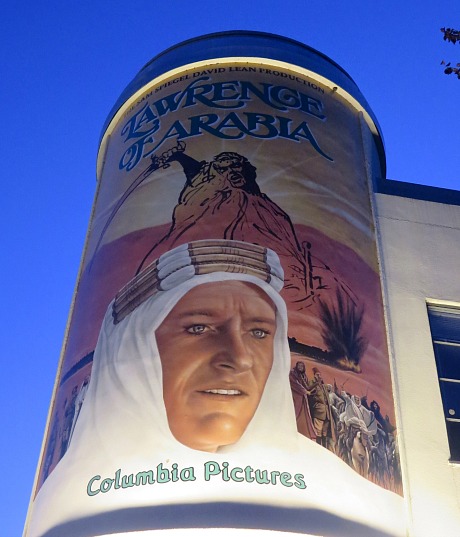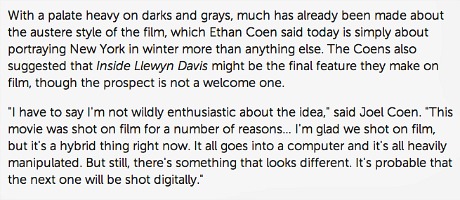This two-month-old trailer for Sandra Nettelbeck‘s Last Love (formerly Mr. Morgan’s Last Love) feels classier and more elegant and generally more appealing than the trailer that was released on 9.27 (i.e., yesterday). For one thing the late July trailer admits that the film is set in a French-speaking city (pic was shot in Paris and Brussels) while the new version seems to be trying to obscure that fact. I haven’t seen Last Love (Image, 11.1), which costars Michael Caine, Clemence Poesy, Justin Kirk and Gillian Anderson. But I know that Nettelbeck knows what she’s doing. Mostly Martha (’01), which she also directed and wrote, is one of the most sensibly satisfying romantic films of this century.
Month: September 2013
Curtis Virus
I believe that Richard Curtis has done more to sugarcoat and suffocate the romantic comedy genre than any other director-writer I can think of. If there’s someone else who has injected his films and scripts with more mirth, fluttery-ness and forced euphoria, I’d like to know who that is. Curtis has no discernible interest in ground-level reality (as the way-above-Curtis’s-level David O. Russell does) . When writing romantic material he seems interested only in those levitational moments when an attractive man and a simple-but-dishy woman can finally let their true feelings out and look into each other’s eyes and….aaahhh! In my view anything with the Curtis stamp is an instant must-to-avoid.
A More Colorful Version
I’m inclined to accept John Wells‘ explanation about why August: Osage County (Weinstein Co., 12.25) ends with a shot of Julia Roberts driving down an Oklahoma road in a pickup truck rather than on the isolation of Meryl Streep‘s sharp-tongued matriarch sitting at home with Eric Clapton, which is how the play version ended. In a 9.11.13 L.A. Times story Wells, the film’s director, told Steven Zeitchik that research audiences didn’t like the Streep ending and “were terrified about what happened to [Roberts’ character]…keeping it the way it was in the play was just too alienating to the people the film needed to appeal to,” Wells says. “I heard it over and over again — to the point that it was ‘Let’s see what happens if we put Violet on the steps and then cut to Barbara.’”
“A Very Fragile World”
With the 50th anniversary of the JFK assassination approaching, expect a deluge of articles, books, documentaries (including a new four-hour American Experience examination premiering on PBS on 11.11 and 11.12) and even a theatrical re-release of Oliver Stone‘s JFK. Yesterday I watched a four-month-old Newseum discussion of the JFK murder by Robert MacNeil and Jim Lehrer, both of whom were in Dallas that day. Lehrer is openly contemptuous of Stone’s 1991 film, and I must say their refusal to give any credence to conspiracy theories seems a bit smug and stubborn. But they were notepad-and-shoe-leather reporters who were right there — McNeil may have obliviously spoken to Lee Harvey Oswald in the immediate aftermath of the shooting, he says — and doing their best to differentiate between the wheat and the chaff. Agree with them or not, but they exude a certain authority.
Raised In A Zoo
Yesterday was a near-total loss due to a huge effort to get my apartment back into shape after it was turned into a wreck by the 20something guy I subletted to during my absence at Telluride, Toronto and New York (8.28 to 9.26). I always sublet during festival sojourns and have done so for 15-plus years without an issue, but my luck ran out when I okayed the smiling, mild-mannered Sajan Patel. I spoke to his boss as a reference, but this guy was a dog with fleas. He flat-out murdered 60% of my plants, killed my 50-inch Vizio plasma (it’s been stricken with some kind of fatal ailment), starved my cats (although my obese Siamese cat Mouse having lost 2 or 3 pounds is actually a good thing) and made the place look like a cyclone had blown through it. I asked this fine young fellow why he’d destroyed most of the plants and he actually replied, “They are not my responsibility as this is is not my home — I was only here for a month.” I gave him $100 bucks to cover his previously paid rent and immediately kicked his ass out. I had to buy a new TV last night, and will have to fork over $300 to $400 to replace the dead plants.
Underlining A Transition
At 1:47 cinematographer Robert Surtees does a kind of stylized fourth-wall breakthrough. Instead of resorting to the usual rack focus after Anne Bancroft exits the frame, he manually slows the focus on Katherine Ross‘s face, taking three or four seconds to portray what’s happening in her head. A similar device is used in The Verdict when the camera stares two or three developing Polaroid snaps of a comatose woman in a hospital bed. As they become more and more recognizable, a metaphor for the emergence of conscience in Paul Newman‘s ambulance-chasing attorney is conveyed. Name other instances in which a camera or a cinematographer stopped being invisible (i.e., unobtrusively delivering images) and in so doing briefly interrupted the narrative flow to actually “speak” to the audience about an emotional or intellectual development of some sort.
Detective Story
If you’ve read about John Cassevetes‘ Shadows (’59) you know he shot it twice — once in ’57 and again in ’59. The Wiki page says that “the second version is the one Cassavetes favored,” and it’s clearly stated that the new Criterion Bluray is offering the ’59 version. And yet a DVD Beaver screen capture shows a Times Square cityscape that was probably shot in April or May of ’57. How do we know this? Pic shows the 1957 Dean Martin dud Ten Thousand Bedrooms (which opened on April 3, 1957) on the marquee of what I presume to be the marquee of Leow’s State (B’way and 45th). Movies had longer runs back in the day but Bedrooms was generally regarded as a mediocre film and was “not a success” and therefore almost certainly was gone within three or four weeks. Notice also that The Ten Commandments wqs still playing at the Criterion after opening there on 10.5.56, or a good six months earlier.


Why Pick On Edgar Allen Poe?
For a reason presumably known to Lars Von Trier but obscured to almost everyone else, the narration for this Nymphomaniac clip is a reciting of the first sentence from Edgar Allen Poe‘s “The Fall of the House of Usher.” This suggests that the film will be perverse or pretentious or maddeningly oblique. Or perhaps a combination of all three. “During the whole of a dull, dark, and soundless day in the autumn of the year, when the clouds hung oppressively low in the heavens, I had been passing alone, on horseback, through a singularly dreary tract of country; and at length found myself, as the shades of the evening drew on, within view of the melancholy House of Usher.”
Foxcatcher Bumped
Award-season films are suddenly dropping like flies. It began with the date-shifting of Grace of Monaco. Then the discrediting of Diana (which no one ever thought was going to be good, much less exceptional). Then the possible postponement of Martin Scorsese‘s The Wolf of Wall Street (please, please stay the course, Paramount!). And now Bennett Miller‘s Foxcatcher — a 12.20 Sony Classics release that’s been drop-kicked into 2014. Look at the trailer, for God’s sake. Solemn mood, refined chops and what is clearly an exceptional, possibly nominatable Steve Carell performance. (Plus a very interesting one from Channing Tatum.) The season has just become less interesting, less dimensional. One less highly nutritious film for December. (I’ve read the script — trust me.) I for one feel cheated, shortchanged. If I were Carell right now I’d be punching the refrigerator door like nobody’s business.
Seen From Flying Aircraft

Tony Tasset’s 94-foot-tall rainbow arch on the Sony Studios lot was erected almost a year ago, but I wasn’t paying attention or whatever. Last night I noticed it for the first time when I drove on the lot through the Thalberg gate for a screening of Alex Gibney’s The Armstrong Lie.


The End
From Brian Brooks’ 9.26 Indiewire account of the Inside Llewyn Davis press conference, held at the New York Film Festival’s press venue, the Walter Reade theatre. Here, by the way, is Marcus Mumford and Oscar Isaac‘s cover of folk classic “Fare Thee Well (Dink’s Song),” which is heard at least a couple of times (thrice?) in the Coen brothers film. We’ll have to wait until 11.12 for the official Davis soundtrack and especially “Please Mr. Kennedy,” which, when performed by Isaac, Justin Timberlake and Adam Driver, is easily the most conventionally entertaining moment in the film.

Plain Spoken Inequality
Jacob Kornbluth‘s Inequality For All (Radius/TWC, 9.27) , which I first saw nine months ago in Park City, is easily one of the smartest and most articulate docs of 2013. A profile of economist and former Labor Secretary Robert Reich, it explains with cool clarity how the game has become more and more rigged by the rich since the Reagan era, and why so many wage-earning middle-classers (including Tea Party lowlifes) are feeling so shafted and angry these days. Everybody knows the dice are loaded. Everybody knows the fight is fixed. The poor stay poor, the rich get rich. That’s how it goes. Everybody knows.

(l to.r.) Inequality For All director Jacob Kornbluth, The Newsroom creator Aaron Sorkin, Inequality star Robert Reich at last night’s post-premiere gathering in Manhattan. (Photo: Shannah Laumeister.)
